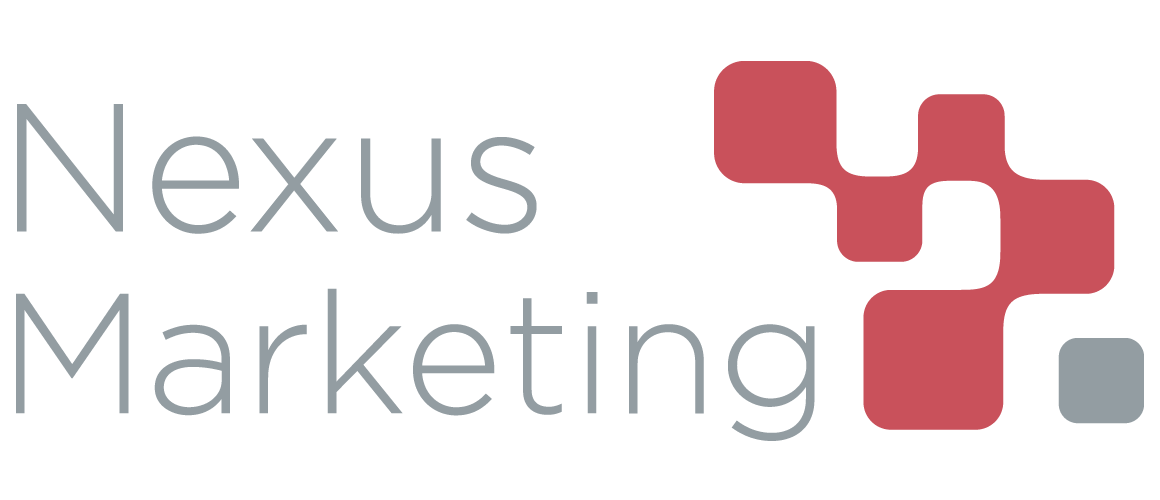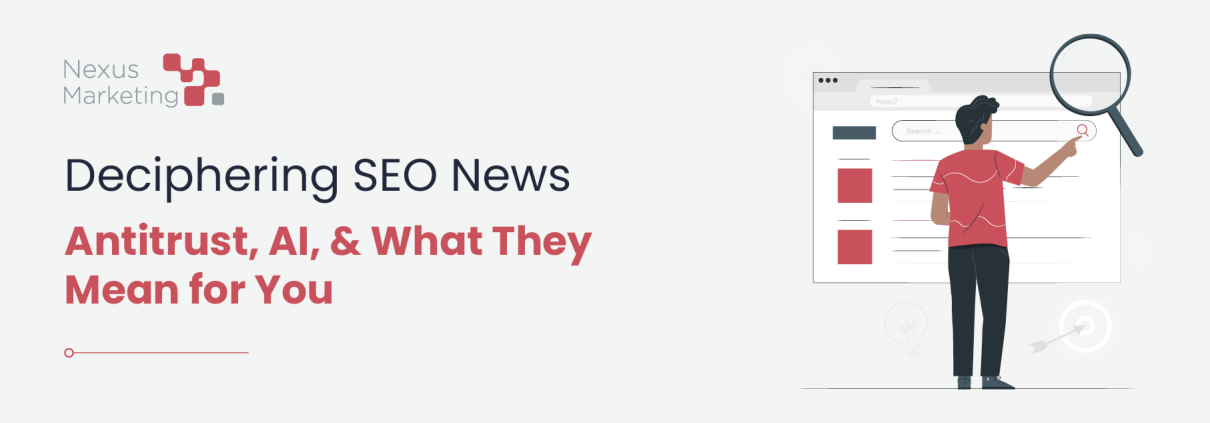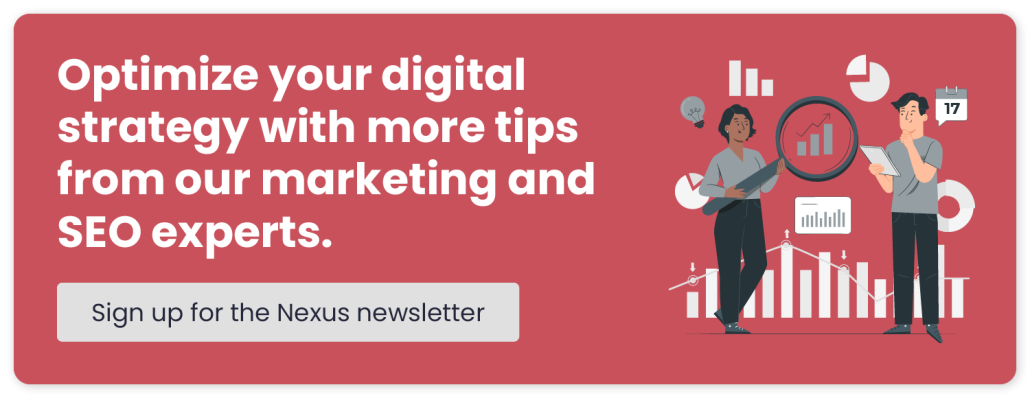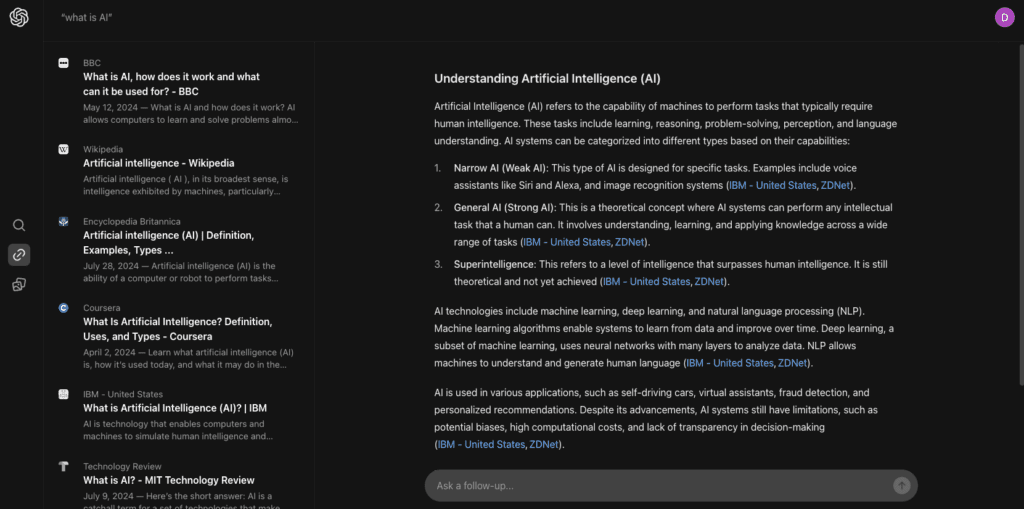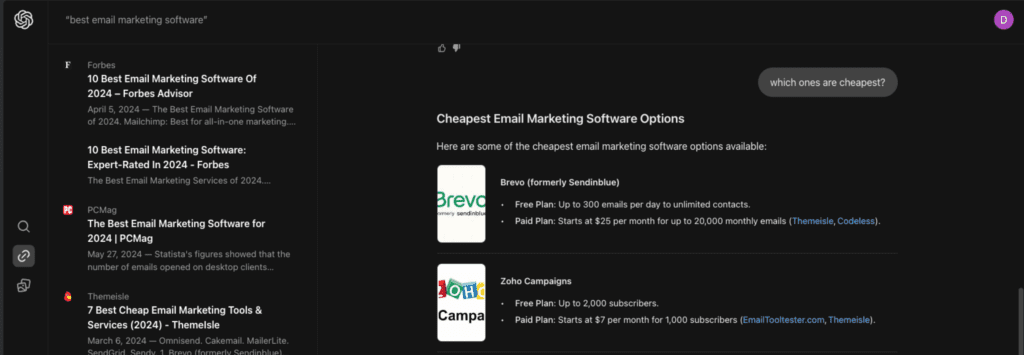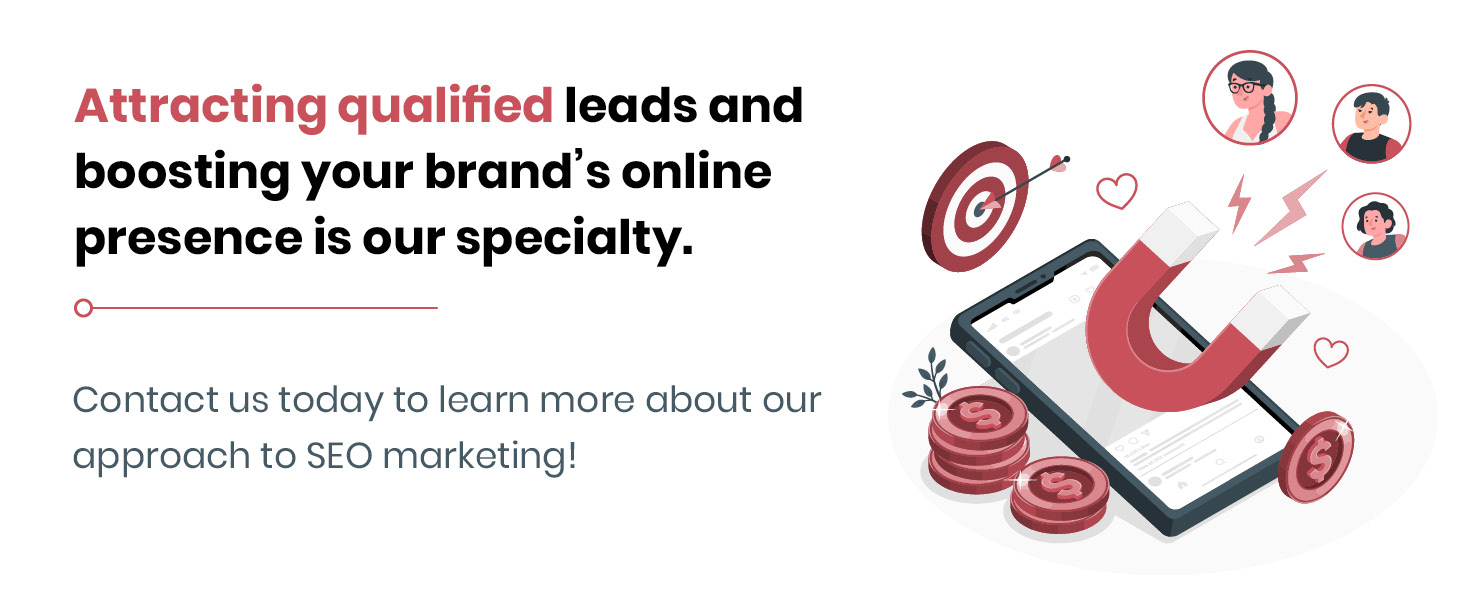Deciphering SEO News: Antitrust, AI, & What They Mean for You
Summer 2024 has been one for the books in the SEO world. We’ve seen some wild industry developments that promise to bring more change to the SEO status quo than we’ve seen in a very long time.
If you keep track of SEO, tech, or digital marketing news, you’ve probably picked up on the buzz.
And you probably have a few questions, namely, “What does all this change mean for my brand and SEO strategy?”
In this SEO news update, we wanted to provide an overview of the biggest news stories of the past couple of months. We’ll cover the key developments, what they mean for you, and our overall take on the story that’s unfolding and the future of SEO strategies in the AI age.
- The Google Antitrust Case
- AI Overviews & Algorithm Updates
- SearchGPT
- SEO in an AI Environment: Our Take
Any questions as you read the guide? Reach out anytime—the Nexus team will be happy to help.
The Google Antitrust Case
We recently posted an explainer on our LinkedIn page (give us a follow!), but here’s a quick summary of what you need to know about this landmark legal case:
- On August 5th, 2024, a federal court ruled against Google in one of the first major antitrust cases in decades, with the judge stating that “Google is a monopolist, and it has acted as one to maintain its monopoly.”
- The case hinged on Google’s exclusive agreements to appear as the default search engine on various web browsers, plus Google’s use of user data to reinforce its market dominance.
- The most direct implications will likely be on Google’s Ad products. A separate trial specifically about ads will begin in September, 2024.
This article from Search Engine Journal provides a helpful explanation of the ruling from an SEO perspective.
So what will happen as a result of this ruling? It’s unclear, and we won’t know for a while. Many options are within the realm of possibility, and there are already some reports that the court might move to take any of these actions:
- Break up Google Search, Android, and Chrome
- Ban default browser-search engine agreements
- Enforce data sharing between Google and other search engines
- Split Google Ads into a more fully separate company (We’ll know more on this front following the September case.)
What It (Probably) Means for You
What are the potential SEO implications of this case?
Regardless of the specific legal outcomes, we’re likely to see increased diversity in traffic sources. You may not think often about Bing or DuckDuckGo today, but there’s a good chance you will in the future. Other search engines use ranking systems very similar to Google’s, so the SEO best practices will remain steady.
OpenAI’s newly announced search engine, SearchGPT, will also likely shake up the landscape in the coming years—more on this below.
Key takeaways:
- An adaptive, user-centric (not just Google-centric) SEO strategy will be more essential than ever.
- The best practices aren’t going any where, but now’s the time to confirm you’re actually following them to ensure your performance translates across search engines.
- If your business relies heavily on pay-per-click strategies to generate leads, you need to stay tuned into the developments on that front.
AI Overviews & Algorithm Updates
In more Google news, we’ve seen many improvements and tweaks roll out in recent months.
Google’s AI Overviews have received some beneficial changes after a rocky rollout earlier in 2024. In terms of design and interface, here are the key updates:
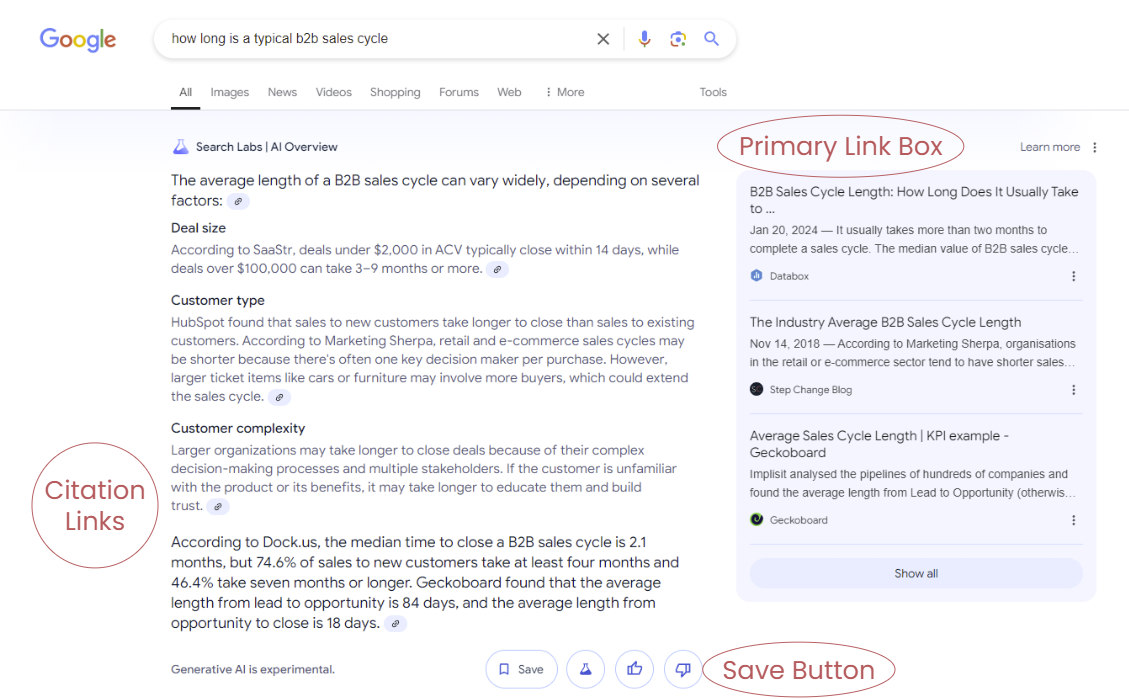
AI Overviews now more prominently highlight their linked sources—this is huge news since the primary concern in the SEO world has been that the Overviews would obscure their sources and seriously dampen clickthrough rates.
Specifically, the updated AI Overviews include these features:
- Prominent right-hand link panels that cite the sources
- Citation links within the Overview indicated with link icons
- Save buttons for users so that the Overview won’t change if they search the query again
- Some limited rollout of in-text links, like normal anchor text (not pictured)
AI Overviews are also now being deployed outside of the US for the first time, and they will also display for users using incognito mode or who are not logged into Chrome.
What do these developments tell us?
- Google seems to be already responding to its early competition in the AI-driven search space. As we’ll see below, SearchGPT’s prototype prominently highlights linked sources. The lack of prominent links (and the assumed suppression of clickthrough traffic) was by far the biggest SEO criticism of AI Overviews upon rollout.
- AI Overviews are generally becoming more stable and reliable. Remember those wild stories about Google’s questionable AI advice at first? Now, one industry study found that 99.5% of AI Overviews cite content that already appears within the top 10 organic results for their queries.
- This is a particularly positive sign. It reinforces the idea that robust, best practice-driven SEO will continue to deliver value in AI environments.
Something to be aware of: We’ve seen that for content linked in AI Overviews, some SEO rank-tracking tools report those pages as ranking in the first organic position. However, the link might be one of many within the Overview. In other SEO tools, rankings within AI Overviews are sometimes tracked inconsistently or incorrectly. We’ll see continued changes in the reporting and logistical impacts of AI Overviews, so keep an eye out.
Beyond the AI Overviews, we’ve seen a handful of other big developments from Google recently:
- Automated SEO and performance recommendations within Google Search Console (currently limited rollout, but we’ll keep you posted!)
- The August 2024 algorithm update currently mid-deployment is expected to smooth out many ranking issues and volatilities that sites have seen over the past year. The “Helpful Content Update” of September 2023, while beneficial for many sites, did seem to unfairly penalize some smaller publishers. This month’s update has been perceived as a fix to many of the issues it inadvertently caused.
What It Means for You
We have a few conclusions we can draw from these recent Google updates:
- Google is actively refining its use of AI and improving how it links to source content in AI Overviews. Again, this was the main initial concern in the SEO sphere, so it’s welcome news.
- However, remember that AI Overviews are still expected to generally reduce the clickthrough rates of content—we’ll recap our take on how SEO strategies should adapt below.
- We’re going to see continued activity from Google as it makes improvements and tests new features. Competition in the search space is ramping up for the first time in a long time.
SearchGPT
Finally, the big news out of OpenAI earlier this summer: Its very own AI-infused search engine, SearchGPT.
We don’t know yet when it will be widely available, although the prototype is currently available to a small group of test users.
If you’ve seen headlines about SearchGPT and wondered how it will affect the SEO landscape, let’s first clear the air.
Does SearchGPT have the potential to dramatically change how we find information online? Yes.
Do you as a marketer or SEO stakeholder need to worry? No. SEO is not changing overnight. Your brand will still be visible online, just in new ways.
Should you up your SEO game (or partner with experts to handle it for you)? Yes, probably.
There are still many uncertainties in the AI world. Economists have pointed to an “AI bubble” of investment funding that’s likely to burst (or at least shrink). New AI-based projects and developments will keep coming and going, and rapidly.
It’s just way too early to make any concrete predictions about what’s to come at the intersection of AI and SEO.
Here’s what we know about SearchGPT so far:
SearchGPT will work similarly to Google’s AI Overviews. Content identified as the highest quality and most relevant to a query will be used to generate an answer. You’ll be able to refine your search with suggested follow-up questions, although it is not a chat-style LLM like ChatGPT.
The SearchGPT interface very prominently displays links to the source content, seen in this example:
This example screenshot shows the generated answer for the query “What is AI.” On the right side is the AI-generated answer, including linked citations. On the left is a list of the source content, including domains, titles, publish dates, and meta descriptions.
SearchGPT will also proactively suggest follow-up questions and query refinements:
This response for the query “best email marketing software” includes a prompted follow-up question, “which ones are the cheapest?” The results show specific products with prices and citations.
(We pulled these examples from Go Fish Digital’s recent walkthrough of the platform—highly recommended if you want to learn more!)
One important note: You’ll notice that the source domains for these examples are all big-name players like BBC, Wikipedia, IBM, Forbes, and PCMag. Results are currently limited to a small set of domains that have opted into the prototype. It’s unclear when and how OpenAI plans to expand the pool of content it uses to generate results.
Key takeaways:
- SearchGPT just looks plain cool and easy to use. It’s a tidy, ad-free experience that brings together many of the things that have worked well in Google’s AI Overviews so far.
- The cleanness of this interface is likely to be a big differentiator for SearchGPT (assuming it launches publicly in this form). Google, however, has already explicitly stated that ads will be incorporated into AI Overviews (assuming these plans aren’t shaken up by the company’s antitrust proceedings).
- This new platform will also push the SEO industry forward and likely spur the evolution of technical and content best practices. But note the multiple assumptions mentioned above—it’s simply too early to concretely speculate about any specific impacts.
What It Means for You
Nothing, at least right now.
The one immediate conclusion we can draw is that competition is ramping up for Google if this product truly takes off.
In terms of your SEO strategy, SearchGPT is likely to work on a very similar system for analyzing and ranking content.
If you already perform well, we think you’ll likely do well on this more AI-forward search engine. If you make fundamental SEO improvements to your website and content, they should theoretically help you on any search engine.
Just keep in mind that we still don’t know exactly how SearchGPT will rank content and whether it will crawl the whole web or stay limited to smaller sets of domains. The answers to these questions will impact the specific technical best practices and steps you should follow to maximize visibility in its results. We’ll keep an eye on it and update you as we learn more.
SEO in an AI Environment: Our Take
First, what’s the throughline in all of these news items?
Competition and diversification are ramping up, and Google is now (we think) forced to make improvements to defend its dominant market position. AI is an integral component of all this change.
But if you’re worried that the dramatic infusion of AI into search engines will catastrophically disrupt SEO as we know it, think again.
We’ll walk through our thought process:
1. AI & search are old pals.
Did you know that Google Search has long included AI-powered systems that work to understand language by making connections between concepts?
The introduction of AI into SEO has been a long, slow process—not an overnight change, even though all the headlines have made it feel that way.
Google’s ability to parse language has become incredibly sophisticated over the years. Much of the “leaked” Google documents this year didn’t actually include any surprises on that front.
This means that SEO professionals already know how to adapt and drive results in an AI-infused environment. We just haven’t been explicitly talking about the evolution of search in terms of AI for very long.
Remember the study mentioned above? 99.5% of AI Overviews cite content that already appears within the top 10 organic results for their queries.
Users will always prefer human-centric content from trusted, high-quality websites. These will be the pages, sites, and brands that AI systems prefer to pay attention to.
In other words, users, search engines, and AI systems are all likely to define “good content” very similarly.
So even though it’s unclear exactly what technical processes will power SearchGPT, we think they won’t be radically different than those that power Google today. You’ll just need to stick to the fundamentals, learn, adapt, and grow like normal.
2. Technical practices change, fundamentals don’t.
Technical best practices have to evolve to keep up with changing technology. Surface-level content trends come and go, too.
However, the fundamental guiding principles of effective SEO do not change. What are they?
- Create helpful, authoritative content for other humans.
- Maintain the technical health of your site so that users and crawlers can access it.
- Build your website’s and brand’s reputation over time to prove trustworthiness.
As the space evolves, we’ll undoubtedly see new best practices and technical requirements for achieving these fundamentals (but this would happen even if AI were taken out of the equation).
Our recommendation? Work toward achieving the fundamentals and stay on top of developments in the industry without making drastic overnight strategy shifts.
3. But we can count on a few new priorities.
All that said, there are a couple of new strategic priorities that you should keep in mind as the SEO world changes.
These are the same big-picture takeaways we first identified back when AI Overviews were launched:
- Pay attention to your site’s lower-funnel content.
- We can confidently assume that AI-infused search engines will reduce the clickthrough rates of top-funnel content. These are the broad, educational queries where AI is best poised to fully satisfy the user intent.
- Full-funnel conversion journeys—rich collections of helpful content that guide users through the whole process of learning about your offerings—will perform best going forward.
- What you should do: Double down on understanding user intent and implementing conversion rate optimization best practices.
- Brand-building will become increasingly important.
- All search engines (AI or old-fashioned) want to understand who you are, what you have to say, and whether you can be trusted.
- The modern concept-mapping processes used by Google and AI systems rely heavily on associating authors and brands with content.
- What you should do: Attribute your content to specific, real authors. Attend speaking engagements to get your brand out there. Share partner posts with other authoritative domains. There are tons of ways to build your brand.
If you’re already achieving the fundamentals of SEO listed above, you have what you need to succeed with these strategic priorities.
We can help with everything, too, including executing full-funnel content strategies, implementing CRO improvements, partner posting, and other brand-building activities.
Have questions about anything we’ve discussed in this guide? Curious to learn more? Let us know!
Please contact us to learn more about our full range of digital marketing, SEO, and lead generation services.
And if you’re a Nexus client or partner, please contact your Nexus points of contact—we’d love to chat.
